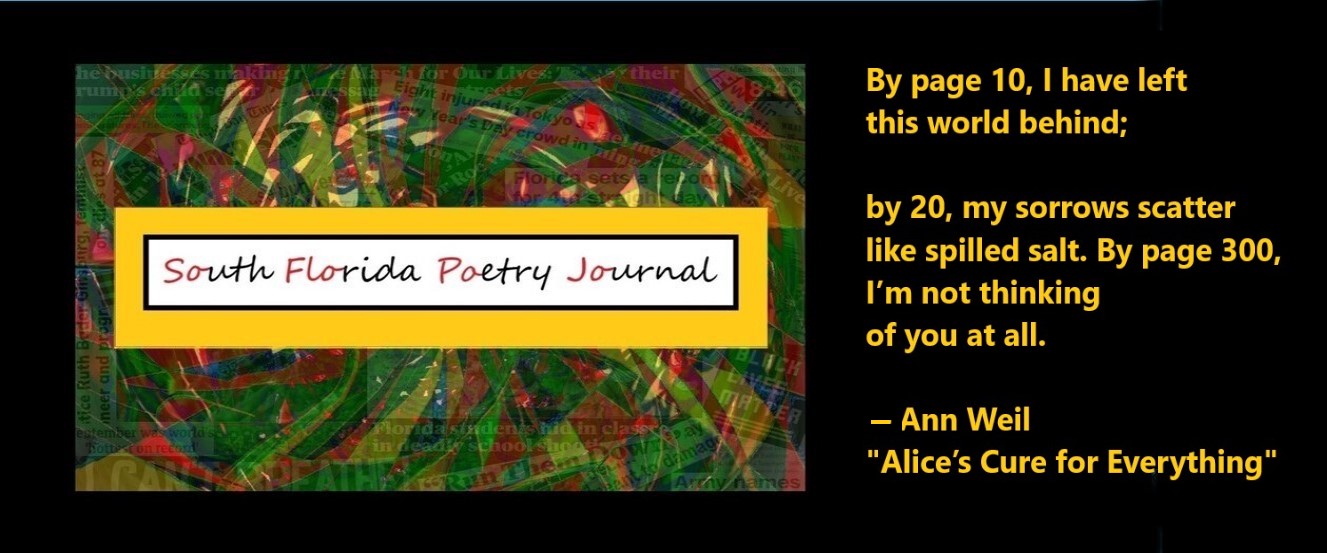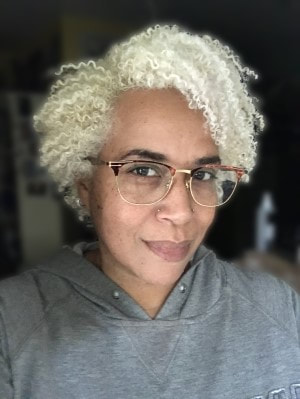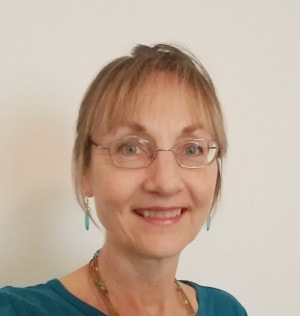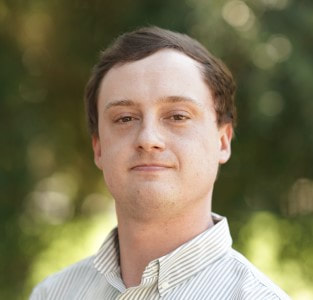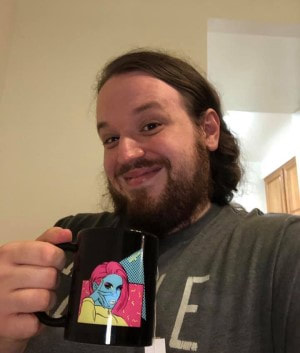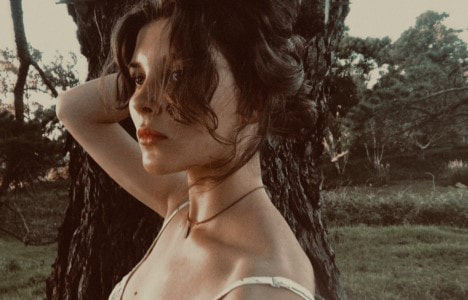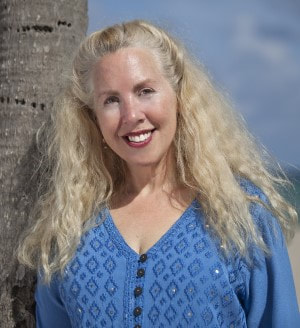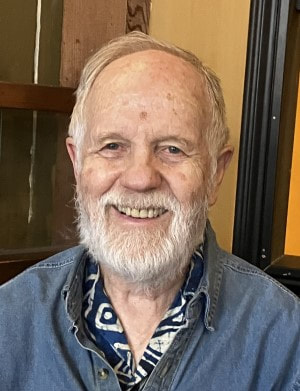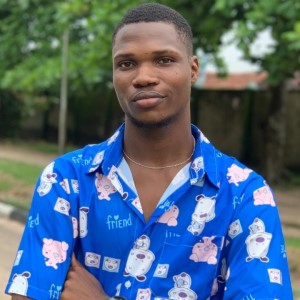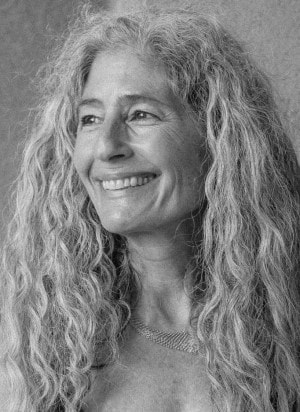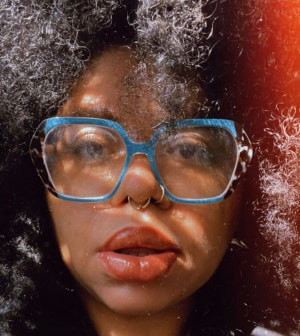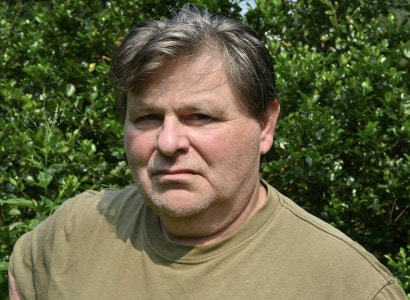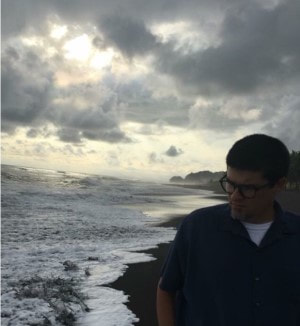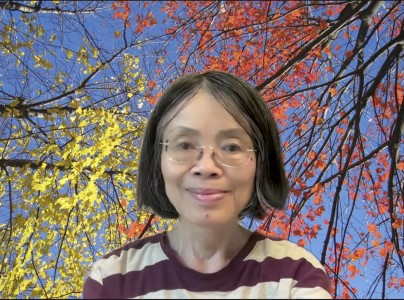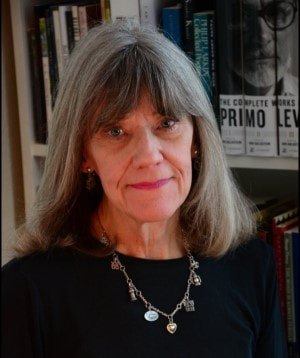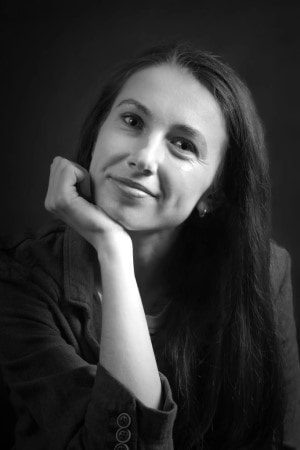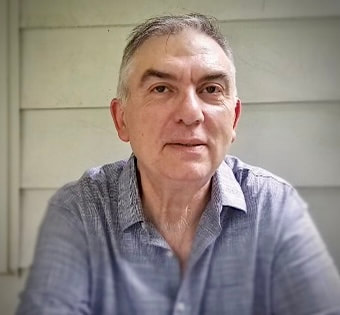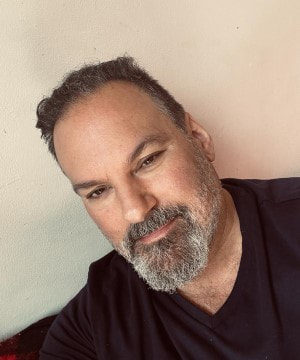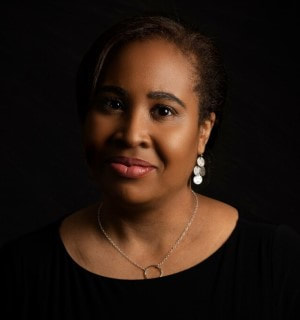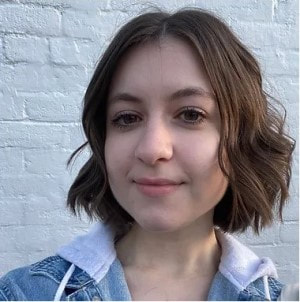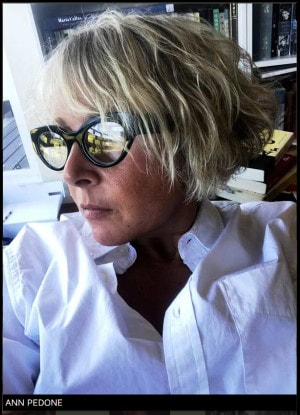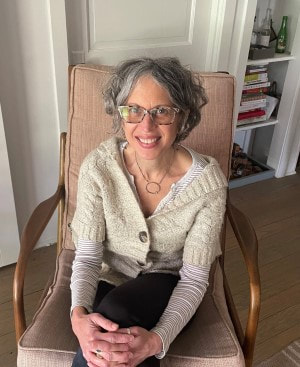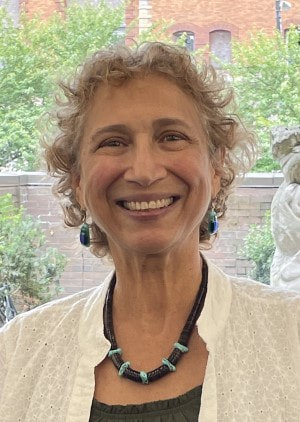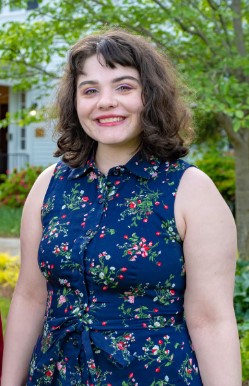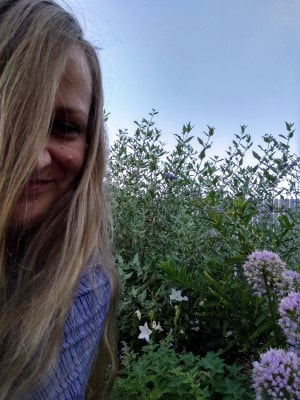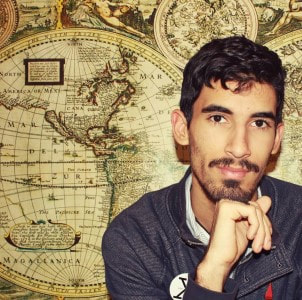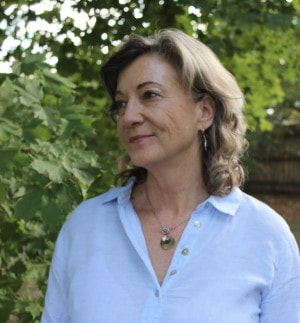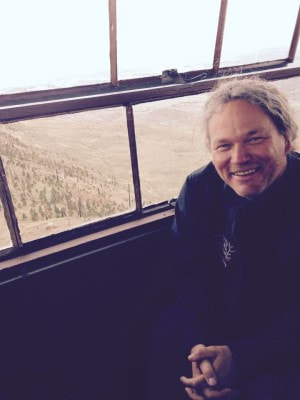Please REGISTER & VOTE in all of your local, state, and federal elections; click here for more information.
SoFloPoJo Contents: Essays * Interviews * Reviews * Special * Video * Visual Arts * Archives * Calendar * Masthead * SUBMIT * Tip Jar
Yael Valencia Aldana, Karen Bramblett, William Ward Butler, Alex Carrigan, Eartha Davis, Denise Duhamel, Heikki Huotari, Prosper C. Ìféányí, Elizabeth Jacobson, Dani Janae, Richard Jordan, Steve Lambert, Xiaoly Li, Martha McCollough, Cecille Marcato, Liana Meffert, Marda Messick, Juan Pablo Mobili, Michael Montlack , Colette Parris, Natalie Eleanor Patterson, Ann Pedone, Christy Prahl, Bonnie Proudfoot, Annie Przypyszny, Whitney Schmidt, Michael Spring, Julio César Villegas, Ann Weil, John Yohe
Content Warnings: National Domestic Violence Hotline https://www.thehotline.org/
National Sexual Assault Hotline: https://www.rainn.org/resources
National Sexual Assault Hotline: https://www.rainn.org/resources
|
POETRY Launch Reading: Tuesday,
Feb 20th at 7 PM ET |
|
Our Associate Editor & Friend, Patricia Whiting,
passed away on January 8, 2024.
We dedicate this issue to her.
Yael Valencia Aldana
|
|
Dear Sociopath
I know you well. The woman that gave birth to me, but is not my mother is of your kind. I feel sympathy. I know as a child you went through things, terrible things. You separated, your feelings fled, so you would not feel the full clench of adult hands on your spider thin neck. I know I am now an object to you, to dominate and command. I understand that you do not feel. Your soft warming thoughts waned and died, boxed and left uncovered in singed heat. That feeling child died beneath broad adult fingers. I understand you only imitate emotions and that you are very good, but like all imitators, you make mistakes. I know the feel of you, the touch of you, a practiced sense from my own childish lessons. Unlike you I feel too much, feel your cool sapphire heart muscle. And as you would do to me, I put you in a box, cover you over, Label you: not to be played with, make you an object― a translucent aquamarine cube do not touch. |
Yael Valencia Aldana is a Pushcart and Best of The Net nominated writer and poet. She is the author of the chapbook Alien(s) (Bottlecap Press). She is the winner of the University Press of Kentucky New Poetry and Prose Series Prize 2023. Her work has appeared in Scapegoat Review, Literary Mama, and Slag Glass City, among others She lives in South Florida with her son and too many pets. You can find her online at YaelAldana.com.
|
Karen Bramblett
HOW TO FIND YOUR COUNTRY
Imagine sitting in an outdoor café, your feet floating on an ocean of limestone tiles. Hear yourself say obrigada as the waitress delivers your lunch of salted cod. Book a trip to Lisbon and make a list of towns you might fall in love with. Arrive at the airport and scrunch the list into a ball. Toss it in the can by the locker wall. Take a taxi to the beach and plop yourself onto the sand steaming with foreign bodies. Gaze at the ocean suspended like a net of lights before you. See how you could almost walk across it. Picture your people falling as bullets fly sideways like rain on a planet that lost its gravity. Become the waves that pummel, and then caress, the shore. Karen Bramblett is an MFA candidate at Lindenwood University. Her poetry is forthcoming, or was previously published, in Thimble Literary Magazine, LEAF, and elsewhere. She lives in Santa Rosa, California.
|
William Ward Butler
The Illuminated Years
We enter the world clean, a gunshot wound through and through; it’s not enough to suture skin: you must inflict, upon tiny organisms, doom, like Odysseus slaying Penelope’s suitors. It’s America, darling, you need to drive faster. We don’t need to consecrate what we feel with law or religion―though it’s nice to have rights, tax credits; easier to explain how great you are with the word husband, though we joke, O roommate! my roommate! Maybe we’ll forever call each other boyfriends. Let me be your undying light; love me after the atmosphere ignites. William Ward Butler is the poet laureate of Los Gatos, California. He is the author of the poetry chapbook Life History from Ghost City Press. He has received support from the Community of Writers and the Napa Valley Writers’ Conference. He is a poetry reader for TriQuarterly and co-editor-in-chief of Frozen Sea: frozensea.org
Vertical Divider
|
|
Alex Carrigan
The Apocalypse Told Me
After Erik Fuhrer’s “Love Affair with the Apocalypse” The apocalypse told me it loved me but never returned. It promised me withered roses, but never gave me more than a poisoned seed. A poisoned seed could carry the promise of sickness, that we could both hold each other as our gums bled and our hair fell out on the floor. The floor was carpeted in black rain after the apocalypse suggested we toss our umbrellas aside and frolic in it. We didn’t even care how it smelled. It smelled like a short but exciting future together, where we could live each day like it would be out last, most likely because it would. It would make all these promises to me, telling me I was a lucky guy to be chosen by the apocalypse to be there after the blast, while my family became shadows on the wall. The wall keeping me trapped in my mundane life had been knocked down, and I could finally be acknowledged and cherished for once in my life. My life wasn’t special though, as it apparently had other lovers amongst the ruins. The apocalypse told me it loved me but never returned. Alex Carrigan (he/him) is a Pushcart-nominated editor, poet, and critic from Alexandria, Virginia. He is the author of Now Let’s Get Brunch: A Collection of RuPaul’s Drag Race Twitter Poetry (Querencia Press, 2023) and May All Our Pain Be Champagne: A Collection of Real Housewives Twitter Poetry (Alien Buddha Press, 2022). For more information, visit carriganak.wordpress.com or on Twitter @carriganak.
|
Eartha Davis
cuimhne
there is remembrance and then there is softening / bodies knitting themselves to apricots, tufts of sky hair / and breath that foams inside birch back, warmed / by the single compass point of a human chest / in a thousand years, current shall ache as she does now / and you, heart one, shall remain tucked under Earth breast, wrapping an umbilical bark around both of us / Eartha wishes to live simply, kindly, and most certainly by a river. She placed second in the 2022 Woorilla Poetry Prize Youth Section and was nominated for Best of the Net 2023, with work published or forthcoming in Wildness, Frozen Sea Journal, Revolute, Arboreal Magazine, Hummingbird Blink, Sour Cherry Magazine, and Eunoia Review, among others. She is a poetry editor at Dipity Literary Magazine, Verdant Journal, and Expressionist Lit Magazine.
Vertical Divider
|
Denise Duhamel
|
SELF PORTRAIT AS WORLD HISTORY
the sandbox years the long era of pencils my bloody/iron age my indelible revolution my age of discovery (disco, Dickenson) my marriage era my divorce crusade my middle (crisis) ages my plagues (COVID and AIDS) my Enlightenment (happiness, progress) those Renaissance Hotel years that Romantic era my epics my Times Roman Empire and subsequent fall |
SELF-PORTRAIT OF MY INSIDES
slick heart/the footfall of my pulse/shells that hum within the shells of my ears/the wellspring of my spine/ Shakespeare sonnets I’ve memorized/my failures vacuum-packed in my gut/a laughing jack-in-the-box popping up/my wooing womb/my pelvis wreath/ emblazoned veins/teeth roots that look like tweezers/ leafy lung bronchi/the looping pearls of my digestive track/spendthrift breath/galaxy dust Vertical Divider
|
Denise Duhamel’s most recent books of poetry are Second Story (Pittsburgh, 2021) and Scald (2017). Blowout (2013) was a finalist for the National Book Critics Circle Award. She is a distinguished university professor in the MFA program at Florida International University in Miami.
Heikki Huotari
|
Good Faith Bad Faith
I can't believe this is the finite universe you chose. The mockery of memory is standing like the cheese but not alone. Set in my ways I am opposed to the impending miracle. Who wrote the moral code upon Godzilla's heart? Who mitigates the burning in Godzilla's bosom? Who if not Godzilla foresaw Sodom and Gomorrah? Why Godzilla why create if only to disown? If the effects of the observer and the butterfly collide then the attention spans of devotees are incommensurate with the durations of their manic episodes. Consider yourself lucky, Rodney: the one hundred thousand and first customer gets respect only. France forgive me for the damage that I do to Spain. Nor suit nor counter suit, both sides are silent, fluent. By what bad faith is the good faith underlain? Vertical Divider
|
The Axiom Of Choice
There is no love lost and no empty space between the cannibal and the non- cannibal. A star not meant to roll rolls down a corrugated metal roof. So bereft of adrenaline I'll never need to lift a car. If there are more words spoken than in the vocabulary then at least one word is spoken twice. Obsession and compulsion walk across no quicksand. Nails are coiled as snakes and inner springs. Nor wax nor wane, half moon, nor borrower nor lender be. It's not the silken veil that catches light but it's the complex lens, the shibboleth of Theseus, the holy book of Theseus, the crows who want to know one and the crows who don't. There was no Santa Claus and now there is a Santa Claus. There was a Santa Claus and now there is a Santa Claus at each of the North and South poles. Pleasure Center I'm thinking of a number between aleph-nought and aleph-one. There'll be as many ways to count the ways as I allow. The silent treatment binding, lines of sight are intersecting daily, i.e., inhumanely. What, big bang, have you done for me lately? Appendages indistinguishable in the interim, on that with which I don't identify I won't expound. Let no man put us under. I'm so sorry, minor obstacle, that you don't have the sense of humor I do and I likely would have sided with your secondary source. A blessing in absentia, heads of hair derive from heads of hair and there's no infinite regress. As it's not funny strange it's funny ha ha and the stream of consciousness stops now. |
Heikki Huotari attended a one-room school and spent summers on a forest-fire lookout tower. Since retiring from academia/mathematics he has published poems in numerous journals and in five poetry collections and has won one book and two chapbook awards. His Erdős number is two.
Prosper C. Ìféányí
|
We Left Nothing
I sometimes cannot make do with myself. I feel there's some other part of me, somewhere, longing For newer horizons. Just as the sea accepts the boat. Just as the lantern attracts the moth. In a dream, I see that the windows are still open; the crow of dawn Perches atop sunflowers wilting in a broken pot. The market place is filled with cherubs and vast secrets. Across a brothel, a father is watching his daughter Smoke and drink bottles of gin on a three-legged stool. The night, a vault of concave dreaminess. The surgical Removal of skins filled with black. I still hear the Road from miles away. Deftly playing this song like the Om and murmurs of a river spurting between pouted Lips. I beat the handmade drums to logic― I am excited as to what sounds to expect from my heart Strumming. I unspool myself like a cassette turning. Rolled up the rugs so I could dance to emptiness of a city Once full of voices. Somewhere in Niamey, the drowned Body of a man is brought ashore. I am waking to the Sounds of birds, and everyone I know is either dead or still Missing―displayed like polaroid photographs of missing Children. In times like this, memory is the refuge there Is to turn the body of one's ship. The memory of paperplanes Detonating imaginary bombs on the earth, the fresh Smell of oysters heaped on enamel trays. The earth sings A dirge, and nothing traverses the sky. The waters roam Free into houses, and make unheralded visitors of a newborn's Feet. This is the first lesson I learnt as a refugee in another Man's land; that refuge is a woman scouring the house Reduced to debris for the left foot of her child's shoe. Vertical Divider
|
The Unbecoming
The thorn now paws the air howling goodbye. In silence, the overloaded canoe leaves our shores. The robbers are back, in the black hidden steps of detonators; beyond the blare of sirened afternoons. Beyond the motorcades―we press to our chests the broken images beyond barricades. The lands where even politicians are born in this iron dance of generators and sting of mortals. Dreams lie smouldering in a cave, the old stare departs and leaves us here on the shore. Nobody foreshadows its going, not even the voice sought its echo. When the night is peeled from the day, we talk of such commonplace things. The wind, the eternal suitors of the dead leaves. Evenings with no silver bell to its tail. The havoc of incandescent rays. I sit on a tongue ageing without memory. Until my eyes lost their blood and seasoned first fruit. I chased the evening to the sword's prayer to the scabbard. I saw the parsing of cities and multifoliated walls of rust gold. Eyes that have lost their animal colour. My grand- father reaching for a nest of fireflies to keep us warm. I was sole witness to the unbecoming of everything. |
Prosper C. Ìféányí writes from Owerri, where he works at Imo State University, Nigeria. His works are featured or forthcoming in Black Warrior Review, New Delta Review, Salt Hill, South Dakota Review, Magma Poetry, Indianapolis Review, Westchester Review, Strange Horizons, Caret Journal, The Offing, and elsewhere.
Elizabeth Jacobson
The Day After My 27-Year-Old Daughter Was Not Incinerated in an Apartment Full of Natural Gas, I Roam and Recollect
Stiltsville
My body is slumber. And mirage
follows mirage. The mind
bashes itself, though blameless.
A steaming cup of coffee on the granite counter appears as if a hallucination.
I drive to Key Biscayne.
A mile from the small island’s coast,
ten feet above the sea,
houses are perched
on rotting pilings―
a distant village in the open water.
Not many on the beach.
A pair of crocodiles
swim just off the shore
taking the waves,
their long snouts raised to the sun.
Sacred Valley
So green and aura-filled, is what I remember.
We dined with other families at the inn
on roasted lamb and blue potatoes from the caretaker’s farm.
Then a night of violent food poisoning seized
my 12-year-old girl.
With fists full of soft bread,
she hiked the next day with us to Machu Picchu.
Her black eyes, her small hands,
hugged the narrow trail
as she bowed under the firmament
and burst into clouds.
Stiltsville
My body is slumber. And mirage
follows mirage. The mind
bashes itself, though blameless.
A steaming cup of coffee on the granite counter appears as if a hallucination.
I drive to Key Biscayne.
A mile from the small island’s coast,
ten feet above the sea,
houses are perched
on rotting pilings―
a distant village in the open water.
Not many on the beach.
A pair of crocodiles
swim just off the shore
taking the waves,
their long snouts raised to the sun.
Sacred Valley
So green and aura-filled, is what I remember.
We dined with other families at the inn
on roasted lamb and blue potatoes from the caretaker’s farm.
Then a night of violent food poisoning seized
my 12-year-old girl.
With fists full of soft bread,
she hiked the next day with us to Machu Picchu.
Her black eyes, her small hands,
hugged the narrow trail
as she bowed under the firmament
and burst into clouds.
Elizabeth Jacobson was the fifth Poet Laureate of Santa Fe, New Mexico and an Academy of American Poets 2020 Laureate Fellow. Her third collection of poems, There are as Many Songs in the World as Branches of Coral, is forthcoming from Free Verse Editions, 2024. Her previous book, Not into the Blossoms and Not into the Air, won the New Measure Poetry Prize, selected by Marianne Boruch (FVE/Parlor Press, 2019), and the 2019 New Mexico-Arizona Book Award for both New Mexico Poetry and Best New Mexico Book. Elizabeth is the reviews editor for the on-line journal Terrain.org.
Dani Janae
|
PRAYER FOR DETECTIVE CHLYSTEK
after Aretha Franklin Forever and ever, his breath climbs my thigh forever and ever – (believe me) – Like nothing you’ve ever felt, his breath, my soul stalled from my body – (believe me) (believe me) – What does a man like you know about terror? 6’5” hulking in the door frame like a thing from a nightmare you ask me again and again the story so it is the same each time – (believe me)(believe meeee) – I don’t slip up I say it again and again I let you know where he put his tongue forever and ever I say it the little prayer – (believe me, my darling) – it was only heart break for me it was only you standing at the door again, asking for [evidence] – (belieeeve me) – there is no one but you if this is a prayer then you are God, and if you are God, you must answer me. – (belieeeeve meeee) (belieeeeve meeee) (belieeeeve meeee) (belieeeeve meeee) (belieeeeve meeee) (belieeeeve meeee) Vertical Divider
|
WILL IT EASE MY GRIEF?
My rapist’s lawyer looks straight out of central casting for smarmy white man in a legal drama. All of the cops on my case are white as grief. They disappeared the black lady detective, one eyebrow cocked up like a herald. Telling her own story in verse. Probably stewing in her own grief. I often think about how there are three days I’d count as my worst: when it happened, the hearing, and the trial that coiled my grief like a serpent. I was too fool off too many TV dramas, thought justice was more than a handshake between two white men. There is grief everywhere I put my hands. My therapist tells me to take a shower, to touch my body and name each part mine. I quickly find this doesn’t ease my grief. I didn’t know most cases end in a plea deal, like mine. I didn’t realize they make you doubt yourself so they don’t have to win or lose. Good grief― lawyers keep score boards like footballers. It’s all a game of putting your star player first. I was somewhere beneath second string. I can’t un-grief my life lines, my legacy, the wiry wrinkles in my forehead. Can’t un-sully the nursing mothers room where I wept and wept. This ain’t the grief I know, it’s a whole nother animal. It’s a man gone red as his tie, red as his throaty chuckle. There is so much room in this room I can’t grief. In the language of justice, my name is swallowed up in the Commonwealth, I exist in no ledger, no documents, I become smoke, second to his name, only grief. Dani Janae is a poet and journalist from Pittsburgh, Pennsylvania. Her work has been published by Longleaf Review, Pittsburgh Poetry Journal, Palette Poetry, Slush Pile Magazine, and others. Her manuscript, Express Desire, was a 2023 CAAPP Book Prize finalist. |
Richard Jordan
|
Not So Bad
Even though it’s winter and the trout won’t rise again for months, and even though I’m thinking of my mother, who’s been gone some thirty years, I’m feeling not so bad. Which is to say the river is still flowing under that thick black ice and I can sense it. Sure, there may be certain times I’m gloomy as a cold front sky, though not right now, not when in these woods, despite the snow, birds are busy chirping through it all. And I know who they are: those chickadees, so small, so ordinary. Still, they always made my mother smile, sometimes sing. She’d say to me, Let’s greet them. Well, hello. |
Richard Jordan's poems have appeared or will appear soon in SoFloPoJo - South Florida Poetry Journal, Midwest Quarterly, Rattle, Valparaiso Poetry Review, New York Quarterly, Gargoyle Magazine, Sugar House Review, Tar River Poetry, The Atlanta Review, and elsewhere. His debut chapbook, The Squannacook at Dawn, won first place in the 2023 Poetry Box Chapbook Contest and will be published in early 2024. He lives in Littleton, Massachusetts.
Steve Lambert
|
Archipelago
The sun bakes faults into our landscapes and those become the landscapes. Mountains remember―push up from ancient tectonic ache. That sounds good to me. The nostalgia prone understand and are fine with it. They don’t want to be forgotten and make geological fools of themselves. It’s not the same as F.O.M.O. Not even approximate. But we all do it, a little bit. Everyone who loves anyone, loves a failed island nation in a sinking archipelago. Vertical Divider
|
What I Mean
Remember this. Whispers will not self-destruct. They are immortal and evolve quickly into aslant messages you could easily mistake for music, music you’d listen to. Music that means good things can be as sad as bad things. But dying prematurely will not make anyone love you more, so forget that. Put that out of your mind. Try sticking with people who say yes when they hear thunder. Try to believe people know things, know you, enjoy your stupid company. Some of them are songs, good ones―songs that fade slowly. Listen closely, thunderstyle. |
Steve Lambert's writing has appeared in Adirondack Review, Chiron Review, The Cortland Review, Emrys Journal, The Pinch, Saw Palm, Tampa Review, and many other places. In 2018 he won Emrys Journal’s Nancy Dew Taylor Poetry Prize and he is the recipient of four Pushcart Prize nominations. He is the author of the poetry collections Heat Seekers (2017), and The Shamble (2021), and the fiction collection The Patron Saint of Birds (2020). His novel, Philisteens, was released in 2021. He and his wife live in Florida.
|
Xiaoly Li
In a Brutal Winter
The war has no eyes or ears. No electricity. No glass windows. No his whisper only months ago before fighting in the front line. Only fragmented buildings. Only a candle’s flame. Only empty air to hug. She knew their goodbye could be the last one, had prayed, prayed for his return. Only a child of indigo passion from his preserved sperm. It will be out of death, humming for those broken. Only thunder cracks the grey sky, but not her will to have, not just one, as many children as possible, of his, theirs, as urgent as when I was born into this world right after my parents survived the forgotten war. Only luxury of choice of wanting babies. May those new lives be the green sea washing away ashes. Xiaoly Li is a recipient of the Massachusetts Cultural Council Artist Fellowship Grant (2022). Her poetry collection, Every Single Bird Rising (FutureCycle Press, April 2023), was a Zone 3 Press Book Award finalist. Her poetry is forthcoming, featured, or anthologized in diode, Salamander, Saranac Review, Spillway, PANK, Chautauqua, Rhino, Verse Daily, and elsewhere. She has been nominated for: Best New Poets, three times for a Pushcart Prize, and four times for Best of the Net. Her website: xiaolyli.art.
Vertical Divider
|
Cecille Marcato
ODALISQUE ON AN EAST SIDE BUILDING
Her giant head turned forever toward loose-limbed strangers along the street, a fifty-foot woman lies supine on a cinderblock garage; her hair involves another building entirely. Dress undone just a little, a cyclone incarcerates her, and half- open eyes, under brows that might feel like actual hair (groomed but feathery) make contact over dandelions no one ever cuts. Breathing through brick, her nostrils flare slightly to prepare a sigh held in perpetuity. Painted gleam on the mound of her cheek reflects even on masonry and on the teeth a white dot caught by light hints at juiciness. Traffic buzzing by her parted lips could see her almost smile. Cecille Marcato (she/her) is an emerging poet, cartoonist, and writing coach living in Austin, Texas. Her work has appeared in Leon Literary Review, Husk, Rio Review and The Nocturnal. Two of her poems received honorable mention in the 2022 Soul-Making Keats Poetry Contest. In 2019 she was one of twenty finalists for the Tin House Emerging Award and in 2018 won the Bess Whitehead Scott Scribes Award. She is a graduate of the Warren Wilson MFA Program for Writers.
|
Martha McCollough
Day
the day is a casual reader
misinterpreting the light
on the table
grasses of forgetfulness
the book half under
the bed is wide awake
& preaching to the cats
the day is a casual reader
misinterpreting the light
on the table
grasses of forgetfulness
the book half under
the bed is wide awake
& preaching to the cats
Martha McCollough is a writer living in Amherst, Massachusetts. She has an MFA in painting from Pratt Institute. Her poems have appeared or are forthcoming in The Bennington Review, The Bear Review, Tammy, Pangyrus, Barrelhouse, Crab Creek Review, and Salamander, among others. Her chapbook, Grandmother Mountain was published by Blue Lyra Press. Martha's poetry collection, Wolf Hat Iron Shoes, is available from Lily Poetry Review Books.
Liana Meffert
|
How to Save a Life
At a dinner party, he turns to me, “Now, is a right-handed or left-handed man more likely to kill himself when he shoots?” I’m always finding him here, in places like this. A man arrives late one night with a coin-sized chest wound. My grandfather pages the on-call chief who is asleep in the surgeon’s lounge upstairs. The chief asks, "Is the man right or left-handed?" My grandfather asks his patient. “Right," he says. “Ok, I’ll be down in a bit," and the line goes dead. My grandfather is a storyteller. He hones his stories, wheedling them like a block of wood with an army knife, carving along the grain until they’re sharp enough to draw blood. The shavings are just scraps blown away by time. “People have been pledging allegiance with their hands over their left lung since they started school. When they aim for their heart, they overshoot." It’s always the truth that kills. “You run for a left-hander. They usually won’t make it." There's just the tinkling of glasses. Of Vietnam, he says, most of my memories are from that year. Like an early summer, back when you could catch fireflies by the jarful. How sparse the summer evenings are now, the rare twinkle like an intrepid memory. I think of catching all those memories in a single jar scooped through the twilight. My grandfather saved his own father more than once, held his wild pulsing heart with two hands and bypassed the walls thick and hardened by time. I don’t know this story well because it’s one he never told. I think there was no one else he could trust, or another who would suffer the loss more. And so, his father lived to 90. There’s a photo lost and found in perpetuity; he cradles his first great-grandchild, me, in the last month of his life. I am nestled along the length of his chest, my wide infant eyes taking careful measure of his face. I realize too late my grandfather lived by fear. It worked like oxygen: stoking a flame so bright he burned to touch. The glow of fireflies’ soft-bodied abdomens requires oxygen, and when oxygen is available, they light up; when it is not, they go dark. |
Liana Meffert is an emergency medicine physician-resident at Medstar Georgetown/Washington Hospital Center in Washington, DC. Her awards include Stanford’s Irvin David Yalom Literary Award, the F. Sean Hodge Prize for Poetry in Medicine, and the Robert D. Sparks Essay Contest. Her writing has been featured in US News & World Report, Medscape, The Examined Life, Intima, JAMA, The Healing Muse, and SWWIM, among others. You can find more of her work at Lianameffert.com. All views expressed are her own.
Marda Messick
Rite of Passage
In a southern city park on a hot afternoon
students arrange their languor in grassy shade,
while office workers walk a lunch break mile
around the geese-loud lake. Into the day
sways a diamanté girl in a princess tiara
and pink hooped gown, attended by her mother
and white-suited men. La Quinceanẽra
promenades, flashing her glance. She lifts
her skirts over marred live oak roots,
leans a shoulder against the rough bark.
In the camera’s rose-filtered eye she’s posed
like a belle before the blockade.
She’s only fifteen and maybe doesn’t know
what the wide trunk hides: the historical sign
that describes the murders of black men
hanged from the tree where she now stands,
smiling for her portrait in the scarred shade
of a southern city park on a hot afternoon.
In a southern city park on a hot afternoon
students arrange their languor in grassy shade,
while office workers walk a lunch break mile
around the geese-loud lake. Into the day
sways a diamanté girl in a princess tiara
and pink hooped gown, attended by her mother
and white-suited men. La Quinceanẽra
promenades, flashing her glance. She lifts
her skirts over marred live oak roots,
leans a shoulder against the rough bark.
In the camera’s rose-filtered eye she’s posed
like a belle before the blockade.
She’s only fifteen and maybe doesn’t know
what the wide trunk hides: the historical sign
that describes the murders of black men
hanged from the tree where she now stands,
smiling for her portrait in the scarred shade
of a southern city park on a hot afternoon.
Marda Messick is a poet living in Tallahassee, Florida, on land that is the traditional territory of the Apalachee Nation. Her work has appeared or is forthcoming in The Christian Century, Literary Mama, Gyroscope, Delmarva Review and other publications.
Juan Pablo Mobili
|
My Personal Teleology
A definition: The explanation of phenomena in terms of the purpose they serve rather than of the cause by which they arise. My mother loved to tell me that story, her voice orphaned, when she’d come to the part about her father, and my thoughts would grow tendrils hoping to climb the trellis of her sadness, losses I did not understand then, poems exiled to my old notebooks that still susurran like Saint Francis greeting his beloved, shy sparrows in his humble little chapel in Assisi, their wings fluttering like prayers that God had not heard so far. Vertical Divider
|
After midnight in our kitchen
was a busy scene, my father up, and dunking what was left of a stale baguette in a glass of cold milk. I was coming home from discussing the responsibilities of poetry in a troubled country like ours, and my mother would join us, half asleep, lighting up a cigarette worried about my brother’s whereabouts. While other families slept, mine talked, loudly, about our wishes, coins we cast down a deep well hoping we heard a distant splash. |
A Vision of My Granddaughter
for Sophia
What if the light at the end of the tunnel
is my granddaughter, in a dress made
of sweet shadows, holding the candle
she lit up at my funeral,
Now a woman who understands
my prophecies, so silly when she was
a little girl entering first grade,
a tunnel of her own.
If anyone could compel me
to emulate Jesus rising
from his tomb in war-torn Jerusalem,
it would be her,
her beauty an ember, since the beginning,
when she learned to walk the impossible tightrope
between her lovely unicorns
and her newly minted parents.
What if she reaches the tunnel’s end
and I’m standing, so young now
that I could even be her son,
now that she’s a woman
and greets me, smiling, surprised,
and holds me in her arms,
while I whisper I told you
I was not going anywhere.
for Sophia
What if the light at the end of the tunnel
is my granddaughter, in a dress made
of sweet shadows, holding the candle
she lit up at my funeral,
Now a woman who understands
my prophecies, so silly when she was
a little girl entering first grade,
a tunnel of her own.
If anyone could compel me
to emulate Jesus rising
from his tomb in war-torn Jerusalem,
it would be her,
her beauty an ember, since the beginning,
when she learned to walk the impossible tightrope
between her lovely unicorns
and her newly minted parents.
What if she reaches the tunnel’s end
and I’m standing, so young now
that I could even be her son,
now that she’s a woman
and greets me, smiling, surprised,
and holds me in her arms,
while I whisper I told you
I was not going anywhere.
Juan Pablo Mobili was born in Buenos Aires, and adopted by New York. His poems appeared in The American Journal of Poetry, Hanging Loose Press, and The Paterson Literary Review, among others including SoFloPoJo, as in many publications in Europe, Asia, Latin America, and Australia. He’s a recipient of several Pushcart Prize and Best of the Net nominations, and his chapbook, Contraband, was published in 2022. He's also a Guest Editor for The Banyan Review.
Michael Montlack
|
|
Astrology
Is it a rare example of human humility― to think we’re steered by the stars―or glaring narcissism to assume they’d care? What a relief―to blame your pettiness on the placement of a planet in such-and-such a house. As if it’s carved into your bark. Your natal chart a one-of-a-kind church, its doors seldom entered but ever open for inspection by cosmic detectives. The constellations rotating like mobiles over our cribs. Permanently outlining us with their illumination. Even when we sleep. If nothing else, it’s a little less lonely under their jurisdiction. When fate shaves a bit too close, as if holding a grudge, sit back in wonder as you bleed stardust. |
Michael Montlack is the author of two poetry collections and editor of the Lambda Finalist essay anthology My Diva: 65 Gay Men on the Women Who Inspire Them (University of Wisconsin Press). His poems recently appeared in Prairie Schooner, North American Review, december, Poet Lore, Cincinnati Review, and phoebe. His prose has appeared in The Rumpus, Huffington Post and Advocate.com. In 2022 his poem won the Saints & Sinners Poetry Award (for LGBTQ writers). Born in Miami, he lives in NYC.
Colette Parris
|
Colette Parris is a Caribbean-American attorney whose work can be found in Michigan Quarterly Review, Scoundrel Time, Gyroscope Review, Cleaver, The Offing, MoonPark Review, and elsewhere. She is a three-time Pushcart nominee for fiction, and three of her poems have been nominated for Best of the Net. She lives in New York. Read more at coletteparris.com. |
After Every Two Words I Hit Mute (In Related News, My Partner Asks Me Why I No Longer Finish My Sentences)
The hostage– The bomb– The quakes– The victims– The mass– The mass– The soldiers– The anti– The ferry– The flood– The child– The masses– The fire– The child– The bodies– The children– The dead– The dead– The dead– |
Natalie Eleanor Patterson
|
Sad Fantastic
Who cares about an unsullied landscape― there’s something so sublime about the way the light from the adult-store billboard illuminates the trachea of that dead deer. What kind of omen is it when even the buzzards fall out of the sky, each one landing with a little pop like a punctured lung. In the bestiary of dead things, I’m an archivist of the prey animals: In a photograph of Yellowstone, a red-tailed hawk picks at the ribs of a doe, her neck thrown all the way back, her tongue lolling out on the snow, which is a rusted shade of brown more often than it is crimson or vermilion or whatever. I won’t pretend to know shit about death, but I’ve been that kind of metaphor before. Like when we were driving up Interstate 5 & you said There are so many places to dump a body around here―I know exactly where I’d do it, & looked sidelong at me. Once, I thought it’d be a privilege to be disemboweled & cannibalized by you―after all, I was already seeing the world through the pink membrane of your stomach lining. How fabulous, how sad fantastic the image: so desperate for your attention that I’m happy just to be here, strung up in your sister’s basement like a stretch of venison, smoked to hell & back, at the very least a little something to get you through the winter. Vertical Divider
|
Love Poem in Which I Do Not Confess
Here are a few of my secrets: I’ve redacted the whole city. I’ve made myself an X on the map, an unfindable thing from legend. Sunlight staves its way through the blinds in a room that does not exist anywhere. Fanblades turn slowly like an eye rolling around in its socket. The only way to make the story end was to flee the kingdom altogether, ride out on the frailest white horse & slit its neck at the state line to leave no trace. This time I abandoned you truly, left you to thornhedge & gossip. There is no one left in Oregon who remembers the shape your mouth made when it cursed me. In my dreams, you demand my address until I black out so hard I wake up. In my dreams, I’m still driving your car out West & the map has been lost to the reeds, to the water that was my blood, rivers named Rogue, named Snake, peril imminent as the scorpion tattooed on your right shoulder. Love, I still blush a little when I call you my stalker. When I’m asked for evidence, all I have is the nothing of myself: You can come to claim your pound of flesh, but there aren’t many pounds left. Now everyone says I made the best of a bad situation. Now everyone knows me like this: I made a story & I broke it & it was all true. If it was a half moon like a cut, it’s a quarter moon now. Love, If I disappear any harder than this, they won’t find my body when it’s all over. Love, I’m the most beautiful thing you’ve never seen, layered under dead leaves in a state forest you’ll never walk. Mistake me for the tremble of birds over the Pacific shore, mistake me for the deer dying slowly over the mountain pass. Mistake me for anything but this: a fixed hearth. An honest truth. A creature with its throat bared to the sky. |
Natalie Eleanor Patterson is a poet, editor, and instructor from Atlanta, Georgia, with an MFA in poetry from Oregon State University. She is the author of the chapbook Plainhollow (dancing girl press, 2022) and the editor of Dream of the River (Jacar Press, 2021), and has work featured or forthcoming in Sinister Wisdom, Hunger Mountain, CALYX, and elsewhere. She is Managing Editor of Jacar Press, an editor for One magazine, and a reader for the Julie Suk Award. She is currently pursuing her PhD in poetry.
Ann Pedone
click Download File (below) to view original pdf
| pedone.from.liz.pdf |
|
From: Liz
Before Lacan decided that das Ding existed somewhere beyond the signified, a middle-aged man in Macy’s third floor lady’s room sucking a woman who had just bought a dozen white t-shirts for her brother-in-law. As if narrative really began with Homer. As if le and la were less definite articles and more an efficient way way to immerse yourself in semi-solid duck fat. In my mid-thirties I ended up in a group text with my college roommate’s father and a woman who was writing a biography of Debbie Reynolds. Every time I tried steering the conversation towards Liz’s cleavage, he would bring up the article he had read in Field and Stream about seventeenth century French realist cinema. The day I lost my stash of notebooks about the history of the Xerox machine. A picture of the boy I dated in high school who, while he knew all of Keats, was a bit of an over-thruster. (page 1 of 6) ______________________________________ “At least you didn’t make the mistake of believing the ability to construct a really tight narrative is any sort of substitute for giving good head. You know, that’s what did your mother in.” Last night in bed when you told me you still had some nuts left in your bag, and that all I had to do was ask. If I said “transhistorical” right this very second would you come back with “meet me in the supply closet at 7?” Some of the men I’ve done have later admitted they were traumatized when they found my collection of Acropolis snow globes in the towel closet. “No, I don’t think my sometimes preferring you semi-hard has anything to do with my feelings about lyric poetry but Has everything to do with the fact that you can’t talk about your mother’s God damn Tupperware collection without using the word “vitiate” at least once.” (page 2 of 6) Vertical Divider
|
“Here,” said the middle-aged woman I made
eye contact with one cold February morning. She was leaning against the door reading a ten year old edition of the Financial Times. When the train stopped, I asked her to get off with me and demanded she tell me everything she knew about the relationship between my husband’s undescended left testicle and vulgate of southern Italy immediately after the first War. What I remember most about my childhood was my mother’s desperate attempts to break free from the strangle hold of positivism. No matter how many times in a day I piss, I’m always stuck in that soft semantic space between the German I remember from college and my desire to write a poem in which Cavafy finally throws the “I” down the toilet and replaces it a Campari with soda. My flight didn’t originate in Cleveland. My flight didn’t originate in Barcelona. My flight didn’t originate in Athens. My flight didn’t originate in Seattle. My flight didn’t originate in Minsk. My flight didn’t originate in Amsterdam. My flight didn’t originate in Shanghai. My flight didn’t originate in Chicago. My flight didn’t originate in Anchorage. My flight didn’t originate in Istanbul. My flight didn’t originate in Houston. My flight didn’t originate in Brussels. (Page 3 of 6) ______________________________________ My flight didn’t originate in Kyoto. My flight didn’t originate in Prague. My flight didn’t originate in Boca. My flight didn’t originate in Boston. My flight didn’t originate in Belgrade. My flight didn’t originate in Melbourne. My flight didn’t originate in Berlin. My flight didn’t originate in London. My flight didn’t originate in Palermo. My flight didn’t originate in LA. My flight didn’t originate in Rome. My flight didn’t originate in Tehran. My flight didn’t originate in Lahore. My flight didn’t originate in San Jose. My flight didn’t originate in Orange County. My flight didn’t originate in Bogota. My flight didn’t originate in Cairo. My flight didn’t originate in Detroit. My flight didn’t originate in Cape Town. My flight didn’t originate in Lagos. (page 4 of 6) Vertical Divider
|
Back when partial nudity
was still not allowed on network TV, I decided to peel off all the wallpaper in my kitchen. I thought for sure I’d find something interesting underneath. A slab of leftover rack of lamb, a little wrist corsage with a few lilies of the valley surrounding a tiny pink nipple of a carnation, the history of masochism in Hungary I’d been meaning to read, or at the very least, a bit of, what used to be known of, as “loose language. This morning I was all set to listen to Lohengrin. The whole thing from beginning to end. But instead I got down on the bedroom floor. Looked real close in the closet mirror and was shocked to see that after 53 years, up inside my body was nothing but more body. (Page 5 of 6) ______________________________________ “Why is your narrator constantly fingering herself?” asked a guy named Randy one night during my writing group’s COVID Zoom meetings. If you got up in the middle of the night and took a block of feta out of the fridge and set it out on the counter, when you go back into the kitchen in the morning, it will still be a block of feta, and the relationship between the signifier and the signified will still be as fucked as it was before the Second World War. (page 6 of 6) |
Ann is the author of The Medea Notebooks (Etruscan Press), and The Italian Professor’s Wife (Press 53), as well as numerous chapbooks. Her work has recently appeared in Posit, Texas Review, The American Journal of Poetry, the Dialogist, Barrow Street, 2River, Tupelo Quarterly, and the Chicago Quarterly Review. Ann has been nominated for Best of the Net, and has appeared as Best American Poetry’s “Pick of the Week”.
Christy Prahl
Isabel, Who Loves Weather
The girl, eleven,
born smaller than a shoe
stands taller now than August corn.
She lifts me clear off the ground at hello.
You’re so light, say her arms.
You’re so strong, cracks my spine.
Isabel keeps howler monkeys in her lungs
and at the forecast of a coming blizzard
releases something primal
that pierces the ears of the men in the room
but makes women think,
Next time, louder.
At fifteen she’ll develop words for these feelings
in some sad bargain with evolution.
Her brain tumbles with ideas, she says,
that wake her in the night.
What do you do to get back to sleep?
She overthinks them until they behave
or gets up to draw them,
she tells me.
Isabel tolerates people
but often prefers the company of dogs,
who demand nothing
but to breathe beside her.
One day she will engineer
a better bicycle.
She will discover a new species of lichen
on a walk through the woods.
She will shatter a drinking glass with her voice
and then she will draw it.
The girl, eleven,
born smaller than a shoe
stands taller now than August corn.
She lifts me clear off the ground at hello.
You’re so light, say her arms.
You’re so strong, cracks my spine.
Isabel keeps howler monkeys in her lungs
and at the forecast of a coming blizzard
releases something primal
that pierces the ears of the men in the room
but makes women think,
Next time, louder.
At fifteen she’ll develop words for these feelings
in some sad bargain with evolution.
Her brain tumbles with ideas, she says,
that wake her in the night.
What do you do to get back to sleep?
She overthinks them until they behave
or gets up to draw them,
she tells me.
Isabel tolerates people
but often prefers the company of dogs,
who demand nothing
but to breathe beside her.
One day she will engineer
a better bicycle.
She will discover a new species of lichen
on a walk through the woods.
She will shatter a drinking glass with her voice
and then she will draw it.
Christy Prahl is an Illinois Arts Council grant recipient and the author of the poetry collection We Are Reckless (Cornerstone Press, 2023). A Best of the Net and two-time Pushcart Prize nominee, her past and future publications include the Penn Review, Salt Hill Journal, Poetry Daily, and others. She splits her time between Chicago and rural Michigan and appreciates subways and siloes in equal measure. More of her work can be found at https://christyprahl.wixsite.com/christy-prahl.
Bonnie Proudfoot
|
Since you've been gone
I make lists, feed the dog whose toffee eyes are question marks, feed the cat whose smoky coat silks my throat, feed birds, who dart and scatter, perch in bare branches that divide an empty sky. The sun thins flimsy clouds while the day holds its breath, icicles melting, or are they getting longer? For every present thing, also absence. Desire is the catbird who crashes into the porch window, stunned body coaxing itself back to life, two soft grey pinfeathers sticking to the plate glass, fluttering. Prayer
It's one of those kinds of days when the breeze, once warm and welcoming turns wicked cold, and my body wants to shrink into itself. At the doctor's I say I hurt here, and here, and he says, I don't see anything, so I don't push it, although I feel like that person who brings the car to a mechanic, only to find that the noise evaporates as soon as it's on the lift. I believe in my arms that used to, my legs that used to. Tonight is the first night of Rosh Hashanah, online, from the temple that has memorial plaques for my mother, uncle, cousins, I will watch a cantor singing Kaddush, my brother will message me the sound of the shofar. Oh, this season of leafcolor and leafswirl, the rattleclap of change, oh stillness, teach me how to move. Vertical Divider
|
Late August
Anyone who lives near the woods knows how still the air feels in August against skin, how warm dry earth seeps into the pores, how a storm brings the first leaves off the locusts, how the poison ivy reddens along the path, and the trail narrows. It is not a metaphor, a worn path is still the best way to traverse the hillside, a break in the trees will offer a clear view, and it is one thing to be in a metaphoric thicket and another to be in an actual one, and now, suddenly you are caught there, in a thicket, as you come upon the last of the large, seedy blackberries, and whose berries are these, the ones flush against the right-of-way, whose clearing is this, where the sun reddens the back of your neck, your fingernails turn inky from reaching for the furthest, blackest berries, the briars tug at your cap, at skin on your shoulders, jab through jeans. It's not a metaphor to say this place has caught you, much as you've caught it, the last tang of something you know will be gone before you get back here, and you think of all the times you almost began to forget that you have a body until you are pierced, stitched, stained by the tug of it all, until you yank back your hands and eat as if you are just another animal stripping berries and you got here just in time. Bonnie Proudfoot lives in Athens, Ohio. Her work has appeared previously in SoFloPoJo. She's published fiction, essays, reviews, and poetry in a variety of anthologies and journals, and has been nominated for a Pushcart Prize and Best of the Net. Her novel, Goshen Road, (Swallow Press) was named 2022 WCONA Book of the Year, and long-listed for the 2021 PEN/ Hemingway. Her poetry chapbook (Household Gods, Sheila-Na-Gig Editions) was released in September of 2022, and reviewed in SoFloPoJo.
|
Annie Przypyszny
|
I HAVE CHILDREN I have three children covered in plush feathers, and I feed them mush straight from my open mouth. I have four children, and at night I tuck them into little oyster shells, because for tiny, sleepy children only oyster shells will do. I have fifteen children, all dancers in a vaudeville troupe in the sky. They are lithe, and gravity- defying, dancing through the air like windswept snow. I have two children and they like it when I hold them. I have five children, each of them a mime stuck in a box, making faces in the shape of upside-down. I have a hundred children, who are easily mistaken for a school of fish or a flock of pigeons, so many and identical they are. I have ten thousand children, that I stole from a fairy tale about ten thousand children in a castle by the sea. I have two children and they love me like a mother. Vertical Divider
|
GIVE AND MAKE
Give me a shoe box. I’ll make you a diorama of a restaurant, or an ice rink, or a museum―do you like museums? If you give me an empty museum, I’ll curate only the finest of artifacts: taxidermy swans, Victorian lockets stuffed with locks of hair, illicit letters sent between lord and governess. Give me a pencil and scratch paper, and I’ll draw you the floor plan of a charmingly vulgar honeymoon suite, with a heart-shaped bed that duplicates itself in the ceiling’s lake of mirrors. You could also give me a four-by-six inch frame, and I’ll help you fill it with children, or just a nice view of a mountain decked in thousands of pink-white flowers. Give me a flower―any flower― and I will tell you a story about how women are like flowers: pretty, and pleasing, and waiting to be picked before they die. But maybe that sounds desperate. Better for you to give me two styrofoam spheres, so I can perform a demonstration in astronomy: see, this big sphere in the middle, that’s you. And I’m the one that circles around. Notice how we never touch, how unfortunate that is, how much more satisfying it would be if the two spheres would just collide. Give me a sign, a hint. I’d even take an ultimatum: it’s me or― but there’s only you. I think you’ll be persuaded. Just give me a shoebox. |
Annie Przypyszny is a poet from Washington, DC pursuing an MFA in Poetry at the University of Maryland. She is an Assistant Editor for Grace and Gravity and has poems published in The Northern Virginia Review, Jet Fuel Review, Watershed Review, The Healing Muse, North Dakota Quarterly, Tupelo Quarterly, Ponder Review, SWWIM, Beltway Poetry Quarterly, and others.
|
Whitney Schmidt
La Goulue
I find her hanging in the hall bathroom: the dancing girl with no hands trapped in a brass frame and stuck to the wall. Her skirts fly up and open into a wide white nothing ― an empty blank the artist gave no form. When I am nine and my body has become too big for ballet, my mother catches me trying to dance like the girl in the picture instead of scrubbing the toilet. She shoves my head down and gives us names: Lazy Lump and the Can-Can Girl. From this moment, the girl's white skirts become terrifying and magnetic. Year after year she holds the same pose and I try to hide my looking, even from myself. The Glutton, they call her, as if she eats their praise. On the right, the dark shadow man ― the only one with hands ― reaches out, watching without seeming to, as if he knows she will always be there when he looks again. On the left, the back of a woman's blonde head― her mother's maybe ― hovers behind the girl who lifts her leg and kicks her skirts apart. We can't see what the mother thinks ― whether the dance and the daughter are good enough for a smile. The girl's eyes say nothing. Still, I know the silent question of her body as clearly as my own. Each year the girl manages to stay upright on one tiny foot as she wobbles and bends, determined to make the falling seem like dancing. Each year the mother's head seems more unreadable. Each year the shadow man grows until the girl is nothing but the man's gaze and I finally see it has been his picture all along. Whitney Schmidt is a teacher, writer, and amateur lepidopterist with a passion for poetry and pollinators. She founded the first student-led secondary school Writing Center in Oklahoma and co-sponsors her school's LGBTQIA+ affinity group. Her work has appeared or is forthcoming in So to Speak, Wild Roof Journal, Mantis, Paper Dragon, and The Banyan Review, among others. She lives near Tulsa with her partner, two pit-mix pups, and various moth and butterfly guests.
Vertical Divider
|
Michael Spring
the opposite of poverty is slow rumba in stereo as a couple in their apartment practice dance steps in striped underwear they move with the percussion of a conga seducing a guitar above the couch is a painting of a woman holding a candle descending the stairs for a man made of smoke smoke from a rose-red candle moves out the window into a blue night from dark trees the moon releases an owl Michael Spring is the author of five poetry books and numerous chapbooks. His recent chapbook Kahlo’s Window won the 2022 James Tate Prize and was published by SurVision Books (2023). He is also a recipient of a Luso-American Fellowship from DISQUIET International. His poems have appeared in Atlanta Review, Crannog, Midwest Quarterly, New York Quarterly, Paris/Atlantic, and Spillway. He is a poetry editor for Pedestal Magazine and Flowstone Press. He lives in Brookings, OR, USA.
|
|
Julio César Villegas
frank e rodgers blvd
bullets in rum barrels water our villagers’ mouths. neither diplomat nor archbishop refute this fact, & laws were passed a week ago proving this to be true. some say Clemente could hit a comet blindfolded, or that Melquiades’ final alchemy was our attention, María Sabina’s pedagogy, a hand unraveling inertia: twirling a falling house inside my palm, over and over. separating theory from truth, tigers from theologians, lockpicking a keyless basement door out of ignorance. entire octave of my first mentor’s keyboard smuggled, rearranged, internalized: you’ll hear every chord today, the same way I heard them looking at Saint Sebastian. in the middle of confessing my parents’ sins, once rain weds to stained glass in the backrows of the church― a local little leaguer hit his first homer of the season. when asked about the incident, he apologizes profusely repeating he didn’t mean to scare awake the windows. all he remembers was closing eyes, swinging at comets so magma enters igneous, ignorance incites invention introversions interpolate inquisitions institutionalize : innocence for ingrates incineration for the illiterate there are hypotheses for why there’s glass in the Atacama, & our textbook’s page can’t hold sand at terminal velocity. climb atop the observatory, dissuade yourself from inertia. no longer a drunk with a musket, a helicoptered legislator, but an unidentified species of promise given a confessional : forgive me father, it’s been childhoods since I’ve held comets. Julio César Villegas
Born in San Juan, Puerto Rico — raised in Essex County, New Jersey. Puerto Rico Se Levanta. |
Ann Weil
Alice’s Cure for Everything
The book wears a red jacket, pocketless― who needs pockets when you have pages? Rain has made a purple morning, clatters on the tin roof. I, never an indifferent animal, prepare reverently for the journey: glasses cresting the hill of my nose, lumbar pillow placed between vertebrae L1 and L5, steaming tea mugged, its plumed breath wafting my way. I am Alice in the wonder of BookLand, poised at the rabbit’s hole― Departure Gate page 1― let me read, let me read. Words open wide their fleshy arms, I settle into an imagined lap. By page 10, I have left this world behind; by 20, my sorrows scatter like spilled salt. By page 300, I’m not thinking of you at all. Ann Weil writes in Ann Arbor, Michigan, and on a boat off Snipe’s Point Sandbar, in Key West. Her recent poetry appears in Maudlin House, Pedestal Magazine, DMQ Review, 3Elements Review, The Shore, and New World Writing. Her chapbook, Lifecycle of a Beautiful Woman, debuted in April 2023 from Yellow Arrow Publishing. To read more of her work, visit www.annweilpoetry.com.
Vertical Divider
|
John Yohe
|
Sueño con serpientes
I dream with serpents I dream with smoke and red suns I dream with snow monkeys and pumas I dream with doors opening out to granite mountaintops I dream with Bob Dylan I dream with Sasha Grey I dream with swimming upsteam away from old bad friends I dream with my baggage helping me to float I dream with inexpensive graphic novels of superwomen I dream with boxes in basements I dream with sex I dream with my mandolin I dream with writing I dream with you |
Born in Puerto Rico, John Yohe has worked as a wildland firefighter, wilderness ranger and fire lookout. Best of the Net nominee x2. Notable Essay List for Best American Essays 2021, 2022 and 2023. @thejohnyohe www.johnyohe.weebly.com
Editor's note: See John's words in our Flash Issue #32 as well.
Editor's note: See John's words in our Flash Issue #32 as well.
